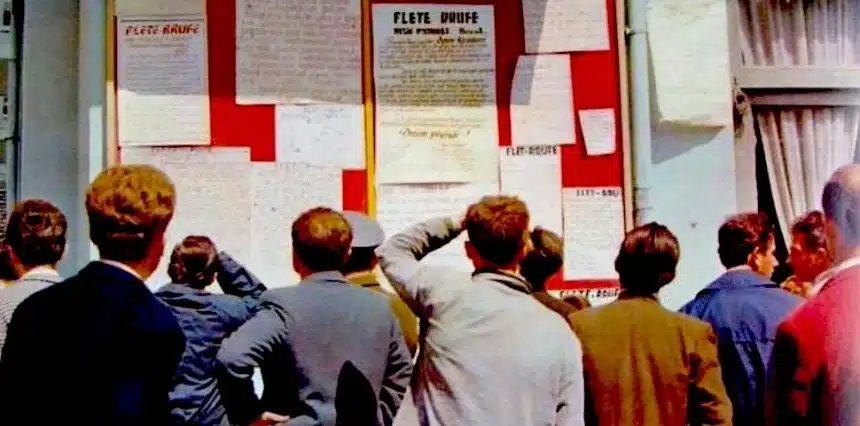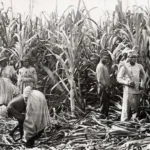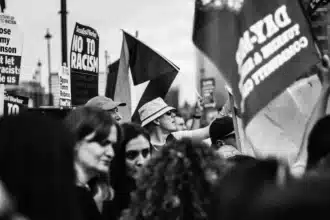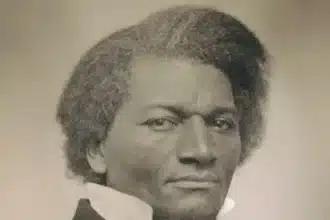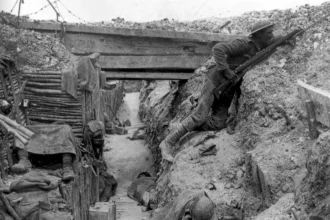The Mechanisms of Control
In the annals of totalitarian governance, the instrument of public scrutiny stands out as a formidable tool wielded to control and manipulate societal norms and individual behaviors. This practice, deeply embedded in the fabric of such regimes, serves not only as a mechanism of surveillance but also as a means of instilling a culture of self-censorship and conformity among the populace.
The case of Albania during its communist era (1944-1991) presents a poignant example of this phenomenon through the practice known as the “lightning sheet”. This instrument and method of public denouncement sheds light on the intricate ways in which public scrutiny was deployed to maintain an iron grip on society.
The lightning sheet epitomized state control, breeding paranoia and conformity in public and private spheres.
By examining the lightning sheet’s role in Albania’s history, we uncover the multifaceted layers of public scrutiny and its profound implications on the human spirit, revealing a stark tableau of the power dynamics that define totalitarian rule.
This exploration serves not only as a historical inquiry but also as a critical reflection on the enduring impact of such practices on collective memory and national identity.
The Genesis of the Lightning Sheet
In the heart of Albania’s communist regime, a particular form of public scrutiny emerged, known as fletërrufe, literally “lightning sheet”. This practice amalgamated the Soviet доска позора (board of shame) and молния (lightning) with the Chinese dazibao (big-character reports): the first ones circulated in Albania since the 1950s, while dazibao was imported in 1967. The lightning sheet functioned as a public critic, where accusations, often without verification, were levied against individuals for nonconformity or alleged deviations from the standards of collective socialist moral. These accusations were conspicuously displayed in public spaces, transforming communal areas into arenas of public shaming.
The fear of being featured on the lightning sheet led to a culture where individuals were compelled to publicly affirm their conformity with the state’s ideology.
The origins of the lightning sheet can be traced back to the early years of Albania’s communist era, especially in working environments. In order to increase or stimulate workers’ yields, in the wall newspapers or emulation boards appeared leaflets – called vetëtimë or fletërrufe – that urged the workers to overcome the norms of production. The wall newspapers and emulation boards also published satirical criticism of defaulting workers. During the 1950s, appeared bodeci (spike), a satirical wall newspaper displayed in a kind of board of shame – like a Soviet model –installed in urban and rural public areas, with the purpose to ridicule people whose behaviour did not conform to socialist morality. The leadership, therefore, sought to create a homogeneous society.
While these public critiques were always prepared by editorials staffs, the lightning sheet could be published by anyone. It served a dual purpose: firstly, to publicly shame those who were perceived as different, thereby deterring others from similar transgressions; and secondly, to reinforce the omnipresence of state surveillance by the collective, reminding citizens that their actions were continually under scrutiny.
This practice was emblematic of the broader dynamics of public scrutiny in totalitarian systems, where the distinction between the private and public spheres is systematically eroded. Individuals found themselves perpetually exposed to the judgmental gaze of the state, the collective and even their peers, leading to a culture of self-policing and mutual suspicion. The lightning sheet, in its essence, was a manifestation of the state’s attempt to control not only the public actions but also the private life, fostering an atmosphere of paranoia, compliance and collective schizophrenia.
The Societal Web Under Public Scrutiny
The implementation of the lightning sheet in Albania under communist rule intricately wove itself into the societal fabric, profoundly affecting social relations and individual identities. This form of public scrutiny did not just aim to punish or expose those who deviated from the prescribed norms but was designed to cultivate a pervasive sense of vulnerability and mutual distrust among the populace. It was a mechanism that turned the community into a self-surveilling entity, where everyone was both observer and observed, potentially the next subject of public denouncement.
Except the leadership, no one was immune to this instrument. The fear of being featured on the lightning sheet led to a culture where individuals were compelled to publicly affirm their conformity with the state’s ideology. This phenomenon significantly altered the nature of social interactions, with people becoming more cautious, and often strategic, in their comportment. Moreover, the lightning sheet exacerbated the existing social stratifications, as those associated with or denounced by the sheets were stigmatized, and the stigma could have lasting implications, from social ostracism to barriers in employment, perpetuating a cycle of suspicion and exclusion.
The legacy of such practices, as epitomized by the lightning sheet, continues to inform contemporary discussions on privacy, freedom, and the role of state surveillance. By understanding the deep-seated impacts of the lightning sheet on Albanian society, we can better appreciate the delicate balance between security and liberty and the importance of protecting the private sphere from undue intrusion.
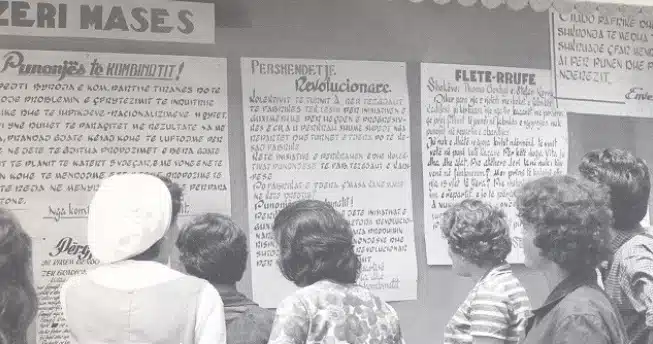
Balancing Act: Scrutiny and Liberty
The narrative of Albania’s lightning sheet provides a compelling backdrop to explore the perennial tension between public scrutiny and personal liberty. This tension is not unique to totalitarian regimes but resonates across different political landscapes, where the balance between collective security and individual freedoms is constantly negotiated. The Albanian experience, however, accentuates the extremes to which the scale can tip when state surveillance overshadows personal autonomy.
The profound implications of such invasive scrutiny invite a broader reflection on the essence of liberty itself. Liberty, in its truest form, entails the freedom to think, express, and act without undue fear of retribution. However, when public scrutiny is wielded as a weapon of control, it becomes a corrosive force, gradually undermining the very liberties it purports to protect. The lightning sheet, in this regard, stands as a stark testament to the fragile nature of freedom in the face of unchecked surveillance.
This historical example prompts a critical examination of contemporary practices of public scrutiny, whether in the form of digital surveillance, social media monitoring, or other mechanisms of control. As we navigate the complexities of the modern world, where the lines between public and private increasingly blur, the legacy of the lightning sheet serves as a cautionary tale. It challenges us to reflect on the kind of society we aspire to create and the role that public scrutiny should play within it.
Echoes of Scrutiny in Modern Albania
The shadow of the lightning sheet, a stark emblem of public scrutiny from Albania’s communist past, continues to cast its influence on the fabric of modern Albanian society. The legacy of such practices prompts a deeper inquiry into how societies transition from oppressive surveillance to democratic openness, and the role historical memory plays in this transformation. The transition from a society under constant scrutiny to one that values privacy and freedom of expression has been a complex journey, fraught with challenges. The remnants of the old system, characterized by mutual suspicion and self-censorship, have been difficult to dispel, revealing the deep psychological impact that prolonged public scrutiny can have on a nation’s psyche.
This reflection on the past also underscores the citizens’ complicity. The power created the conditions and tools, and partly oriented them, but in the end, were individuals who denounced and participated in the public pillory, of pupils as well. The story of the lightning sheet, therefore, is not merely a historical footnote but a living narrative that showed the contours of Albanian society. After the fall of the regime, in 1991, reckoning with the past was done in a hasty, superficial, and emotional manner, cultivating rather oblivion or justifications such as “that’s what everyone did”. Indeed, if we can illustrate this phenomenon of control and public shaming today, it is only because of a few photos or transcripts of lightning sheets, and not to the preservation of some specimen.
The Enduring Gaze of Scrutiny
The historical account of Albania’s “lightning sheet” offers more than just a glimpse into the mechanics of public scrutiny under a totalitarian regime; it provides a profound lesson on the enduring impact of such practices on the fabric of society. This form of public denouncement, deeply entrenched in the era of communist Albania, serves as a stark reminder of the delicate balance between state authority and individual freedoms. The lightning sheet, in its essence, reflected a system that sought to conforms to ideological canons imposed through fear or persuasion of propaganda’s devices.
As we reflect on this chapter of Albania’s history, the true cost of public scrutiny becomes evident. It is measured not only in the loss of personal freedoms but also in the erosion of social trust, the stifling of dissent, and the suppression of individuality. The story of the lightning sheet, with its stark portrayal of public scrutiny gone awry, underscores the importance of historical memory in shaping a future where individual rights are not just recognized but fiercely protected.
As we move forward, the narrative of the lightning sheet implores us to consider the kind of society we wish to cultivate—one that remembers its past to safeguard its future. It challenges us to maintain a critical eye on the mechanisms of control and surveillance that pervade our lives, advocating for a world where freedom and dignity are not casualties of an overzealous quest for conformity. In this way, the enduring gaze of scrutiny, once a tool of oppression, can become a beacon of vigilance, guiding us towards a more just and open society.


